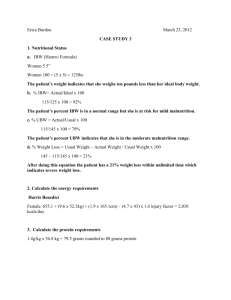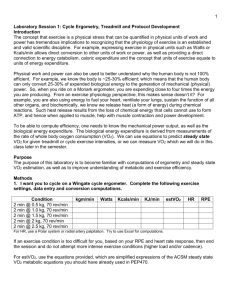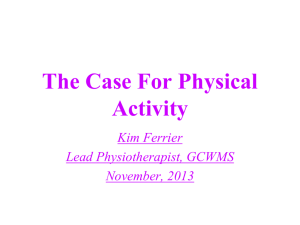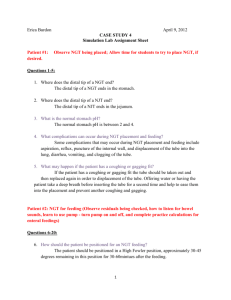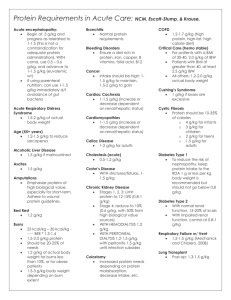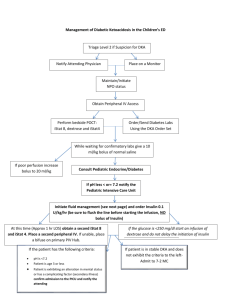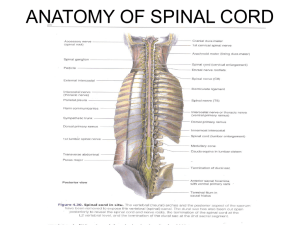NFS 444 - Dietetic Internship Portfolio
advertisement
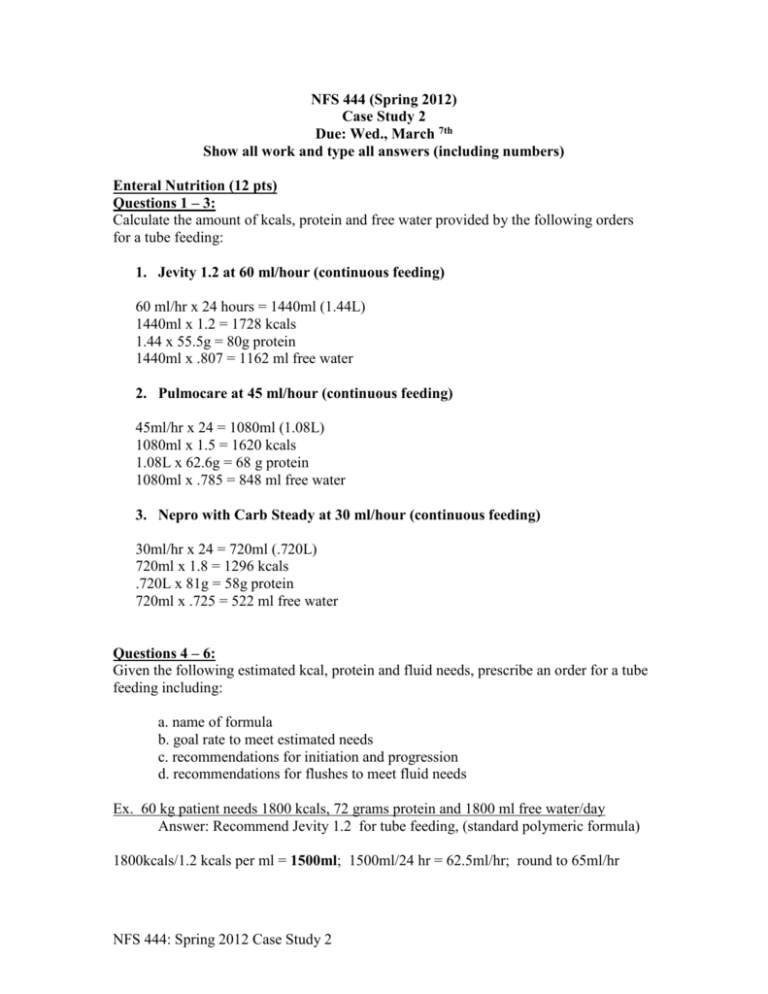
NFS 444 (Spring 2012) Case Study 2 Due: Wed., March 7th Show all work and type all answers (including numbers) Enteral Nutrition (12 pts) Questions 1 – 3: Calculate the amount of kcals, protein and free water provided by the following orders for a tube feeding: 1. Jevity 1.2 at 60 ml/hour (continuous feeding) 60 ml/hr x 24 hours = 1440ml (1.44L) 1440ml x 1.2 = 1728 kcals 1.44 x 55.5g = 80g protein 1440ml x .807 = 1162 ml free water 2. Pulmocare at 45 ml/hour (continuous feeding) 45ml/hr x 24 = 1080ml (1.08L) 1080ml x 1.5 = 1620 kcals 1.08L x 62.6g = 68 g protein 1080ml x .785 = 848 ml free water 3. Nepro with Carb Steady at 30 ml/hour (continuous feeding) 30ml/hr x 24 = 720ml (.720L) 720ml x 1.8 = 1296 kcals .720L x 81g = 58g protein 720ml x .725 = 522 ml free water Questions 4 – 6: Given the following estimated kcal, protein and fluid needs, prescribe an order for a tube feeding including: a. name of formula b. goal rate to meet estimated needs c. recommendations for initiation and progression d. recommendations for flushes to meet fluid needs Ex. 60 kg patient needs 1800 kcals, 72 grams protein and 1800 ml free water/day Answer: Recommend Jevity 1.2 for tube feeding, (standard polymeric formula) 1800kcals/1.2 kcals per ml = 1500ml; 1500ml/24 hr = 62.5ml/hr; round to 65ml/hr NFS 444: Spring 2012 Case Study 2 Jevity 1.2 @ 65ml/hr = (65 x 24) 1560ml; 1560 x 1.2 kcal/ml = 1872 kcals; 1.56L x 55.5g protein per L = 87 g protein per day (1.4g/kg – ok) 1560 ml x .807 free water = 1259 ml free water 1800 - 1259 = 541 ml additional water needed, not provided in tube feeding 541/3 x day = flush with 180 ml every 8hrs to meet fluid needs. Intervention: Recommend Jevity 1.2 for tube feedings. Start at 20 ml/hour, increase by 20 ml/hour every 8 hours, as tolerated, to goal rate of 65 ml/hour to provide 1872 kcals, 87 grams protein and 1259 ml free water. Patient will need additional 540 ml free water/day, recommend flush tube with 180 ml water every 8 hours. Check residuals every four to six hours while advancing feeding; if greater than 100 ml, hold tube feeding for one hour, then recheck. If less than 100 ml, resume tube feeding. 4. 90 kg pt – needs estimated at 2700 kcals, 108 grams protein, 2250 ml free water/day 2700 kcals/ 1.5 kcals per ml = 1800ml; 1800ml/ 24 hr = 75 ml/hr Jevity 1.5 @ 75ml/hr = 1800 ml; 1800 x 1.5 kcals/ml = 2,700 kcals; 1.80 L x 63.8g protein per L = 115g protein per day – 115/90 = (1.3g/kg) 1800 ml x .760 free water = 1368 ml free water 2250ml – 1368 ml = 882 ml additional water needed, not provided in tube feeding 882/3 x day = flush with 295 ml every 8hrs to meet fluid needs. Intervention: Recommend Jevity 1.5 for tube feeding. Start at 20 ml/hour, increase by 20 ml/hour every 8 hours, as tolerated, to goal rate of 75ml/ hours to provide 2700 kcals, 115g protein and 1368 ml free water. Patient will need additional 295ml free water/day, recommended flush tube with 295 ml water every 8 hours. Check residuals every four to six hours while advancing feeding; if greater than 100 ml, hold tube feeding for one hour, then recheck. If less than 100 ml resume tube feeding. NFS 444: Spring 2012 Case Study 2 5. 70 kg pt with renal disease, needs estim at 2100 kcals, 84 grams protein, and doctor orders 1 liter fluid restriction 2100kcals/ 1.8 kcals per ml = 1167 ml; 1167/ 24 hrs = 48.6 ml/hr, round to 50ml/hr Nepro with Carb Steady 1.8 @ 50 ml/hr = 50ml/hr x 24hr = 1200ml; 1200ml x 1.8 kcals/ml = 2160 kcals 1.20L x 81 g protein per L = 97g protein per day 97/70 = (1.4g/kg) 1200 ml x .725 free water = 870 ml free water 1000 – 870 = 130 ml additional water needed, not provided in tube feeding 130/3 x day = flush with 43 ml every 8 hours to meet fluid needs. Intervention: Recommend Nepro with Crab Steady for tube feeding. Start at 20 ml/hour, increase by 20 ml/hour every 8 hours, as tolerated, to goal rate of 50 ml/ hours to provide 2160 kcals, 97g protein and 870 ml free water. Patient will need additional 130ml free water/day, recommended flush tube with 43ml water every 8 hours. Check residuals every four to six hours while advancing feeding; if greater than 100 ml, hold tube feeding for one hour, then recheck. If less than 100 ml resume tube feeding. 6. 50 kg female going home on TF. Requests bolus feedings. Estimated needs are 1500 kcals, 60 g protein, and 1500 ml fluid/day. 1500 kcals/ 1.2 kcals per ml = 1250 ml; 1250ml/ 3 hrs = 417 ml/hr, round to 420 ml/hr Jevity 1.2 @ 420 ml/hr = 1260 ml; 1260 ml x 1.2 kcals/ml = 1512 kcals 1.26L x 55.5 g protein per L = 70 g protein per day 70/50 = (1.4g/kg) 1260ml x .807 free water = 1017 ml free water 1500ml – 1065ml = 483 ml additional water needed, not provided in tube feeding 483/3 x day = flush with 161 ml every 8 hrs to meet fluid needs. Intervention: Recommend Jevity 1.2 for bolus feeding every 8 hours. Start at 420 ml/hour for feeding and then increase as tolerated, to provide 1512 kcals, 70 g protein and 1017 ml free water every 8 hours after the bolus feeding. . NFS 444: Spring 2012 Case Study 2 Parenteral Nutrition (12 pts) Questions 7 – 9: Calculate the amount of dextrose, protein, lipid, and total kcals provided in the following TPN orders: 7. Total volume = (1 liter, 25% dextrose, 4.5% a.a.), 500 ml of 20% lipid 1. 25% Dextrose = 250g/l x 1L = 250g Dextrose 250g x 3.4 kcals/g = 850 kcals 2. 4.5% Protein = 45g/l x 1L = 45g Protein 45g x 4 kcals/g = 180 kcals 3. 500 ml x 2.0 kcals/ml = 1000 kcals Lipids 4. 850 kcals dextrose + 180 kcals protein + 1000 kcals lipids = 2030 kcals 8. Total volume = (1.5 liter, 20% dextrose, 5% a. a.), 250 ml of 10% lipid 1. 20 % Dextrose = 200g/l x 1.5L = 300g Dextrose 300g x 3.4 kcals/g = 1020 kcals 2. 5 % Protein = 50g/l x 1.5L = 75g Protein 75g x 4 kcals/g = 300 kcals 3. 250 ml x 1.1 kcals/ml = 275 kcals Lipids 4. 1020 kcals dextrose + 300 kcals protein + 275 kcals lipids = 1595 kcals 9. Total volume = 2 liter (3-in 1) 30% dextrose, 4% a.a, 2.0 % lipid 1. 30% Dextrose = 300g/l x 2.0L = 600g Dextrose 600g x 3.4 kcals/g = 2040 kcals 2. 4 % Protein = 40g/l x 2.0 L = 80g Protein 80g x 4 kcals/g = 320 kcals 3. 2 % Lipid = 20g/l x 2.0 L = 40g Lipid 40 x 10 kcal/g = 400 kcals 4. 2040 kcals dextrose + 320 kcals protein + 400 kcals lipids = 2760 kcals Questions 10 – 12: Calculate the osmolarity of each of the following parenteral solutions and state whether or not they could be provided peripherally. 10. 1 Liter – 4% a.a., 25% dextrose, 45 mEq Na, 30mEq K, 80 mEq Cl, 5 mEq Ca, 9 mEq Mg, 20 mEq Phos, 50g lipid 1. 4 % Protein = 40g/l x 1L = 40g Protein 40g x 10 = 400 mOsm/L 2. 25 % Dextrose = 250g/l x 1L = 250g Dextrose 250g x 5 = 1250 mOsm/L 3. Electrolytes:(45 meq + 30 meq + 80 meq + 5 meq + 9 meq + 20 meq) x 2 = 378 mOsm/L 4. Lipids = 50g x 1.5 = 75 mOsm/L 5. Osmolarity: 400 + 1250 + 378 + 75 = 2103 mOsm/L -This parenteral solution could not be administered peripherally since the osmolarity is above 900 milliosmoles per liter. NFS 444: Spring 2012 Case Study 2 11. 1 Liter – 3% a.a., 5% dextrose, 25mEq Na, 30 mEq K, 70mEq Cl, 4 mEq Ca, 8 mEq Mg, 15 mEq Phos, 30 g lipid. 1. 3 % Protein = 30g/l x 1L = 30g Protein 30g x 10 = 300 mOsm/L 2. 5 % Dextrose = 50g/l x 1L = 50g Dextrose 50g x 5 = 250 mOsm/L 3. Electrolytes:(25 meq + 30 meq + 70 meq + 4 meq + 8 meq + 15 meq) x 2 = 304 mOsm/L 4. Lipids = 30g x 1.5 = 45 mOsm/L 5. Osmolarity: 300 + 250 + 304 + 45 = 899 mOsm/L -This parenteral solution could be administered peripherally since the osmolarity is under 900 milliosmoles per liter. 12. Write an order for TPN for a 67 kg pt that has the following estimated nutritional requirements: 2000 kcals, 80 grams protein, 2000 ml fluid/day . Make sure that amount of dextrose is not greater then 4mg/kg/min or 6g/kg/day. Write recommendations for both 2-in1 solutions and 3-in-1 solutions. ( 20% lipids) TWO IN ONE Lipid Calculations 2000 kcal x .20 = 400 kcals from lipids 400kcals / 10kcal/g = 40g 400 kcal / 2.0 kcal/ml = 200ml/24hr = 8.5 ml/hr @ 20% 2000 ml – 200ml = 1800 ml Fluid Remaining Needs Protein Calculation 80g protein/ 1800ml x 100 = 4.5 % amino acid solution 80 g protein x 4 kcal/g = 320 kcals from protein Remaining kcal needs: 2000 – (400 kcals lipids + 320 kcals protein) = 1280 kcal Dextrose Concentration 1280 kcals / 3.4 kcals/g = 376g dextrose [(376g/67 kg) = 5.6 g/kg-- ok] 376 g / 1800 ml x 100 = 21 % dextrose solution Rate of Amino Acid/ Dextrose: 1800 ml/ 24hr =75 ml/hr TPN recommendation: Suggest two-in-one PN 21% Dextrose, 4.5% protein @ 75 ml/hr with a 20% piggyback @ 8.5 ml/hr NFS 444: Spring 2012 Case Study 2 THREE IN ONE Lipid Calculation 2000 kcal x .20 = 400 kcals from lipids 400 kcal / 10 kcal per gram = 40 g lipid 40g / 2000 ml x 100 = 2 % lipid Protein Calculation 80 g / 2000 ml x 100 = 4 % amino acids 80 g x 4 kcals/g = 320 kcals from protein Dextrose Calculation (2000 kcals – 400 kcals lipid – 320 kcals protein) = 1280 kcal 1280 kcal / 3.4 kcals/g = 376 g dextrose 376g / 2000ml x 100 = 18.8 % dextrose solution Rate of Amino Acid / Dextrose/ Lipid: 2000 ml/ 24hr = 83 ml/hr TPN prescriptions: Suggest TNA 18.8 % dextrose, 4% amino acids , 2% lipid at 83ml/hr provides 80 g protein, 2000 kcals, 2000 ml of fluid. 13. Explain why it is better to use enteral nutrition (assuming a patient is able to tolerate it) than parenteral nutrition. List three reasons. (1 pt) - Less expensive Avoid complications and infection that will come with parenteral nutrition Using enternal will preserve a healthy GI function NFS 444: Spring 2012 Case Study 2
